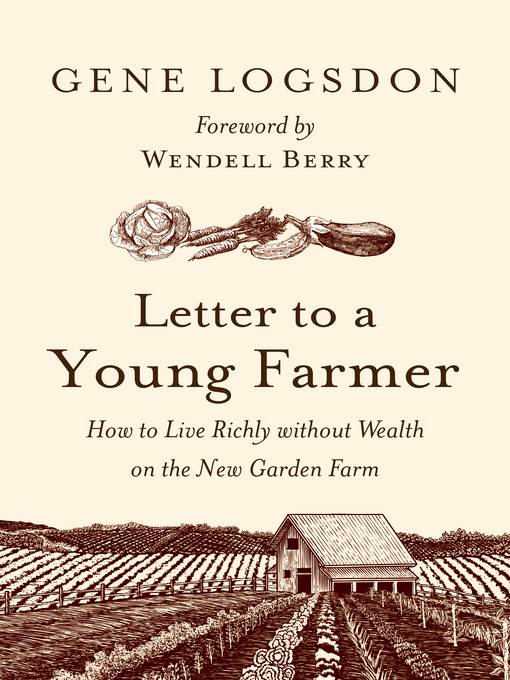
Letter to a Young Farmer
How to Live Richly without Wealth on the New Garden Farm
کتاب های مرتبط
- اطلاعات
- نقد و بررسی
- دیدگاه کاربران
نقد و بررسی

February 6, 2017
Late Ohioan farmer Logsdon (Gene Everlasting: A Contrary Farmer’s Thoughts on Living Forever) sends a meaningful (though poorly titled) message to up-and-coming homestead farmers. Written during the late stages of an illness that would take the author’s life in 2016, the book stands as his final assertion and rallying cry against the misguided notion, so prevalent at one time, that farmers needed to “get big or get out.” The book isn’t written in the intimate style of a personal missive as the title suggests; it’s more of an essay collection squarely addressing topics such as small-scale economics, pasture farming, raising sheep, and the “modern plowgirl,” with practical-minded advice throughout. This work serves as a guiding light and lodestar for farmers facing the modern challenges of any farming operation, large or small.

January 15, 2017
An elegant, modern georgic in prose by "contrary farmer" Logsdon (Gene Everlasting, 2013, etc.).Of a piece with the works of Wendell Berry, Wes Jackson, and other modern back-to-the-landers, Logsdon's last book (he died in May 2016) comprises a set of essays addressed to an imagined young person contemplating a life in the fields. "There's no such thing as the American farmer," counsels the author at the outset. Instead, there are beet farmers, dairy farmers, flower farmers, marijuana farmers, and even "moonshine farmers," which makes it difficult to categorize all the different kinds of farmers and to subsume them into any meaningful political organization. The point is that because there is so much diversity in farming, anyone with intelligence, gumption, and stick-to-itiveness shouldn't be dissuaded from having a go at it. Of course, there are plenty of reasons not to farm, and Logsdon isn't shy of enumerating the challenges, from the fiscal and physical ones to matters that embrace even the heart: one of his essays concerns how to find a suitable helpmeet out in the sticks, where, as a former seminarian, he discovered "there were girls peeking out from behind every crossroads stop sign in the county." Times change, but the struggle continues, one aspect of it the corporatization of farming. Oddly, there Logsdon finds an ally in the chain restaurateur Bob Evans, who encouraged those who would listen to invest in biological over mechanical solutions, saying, "tractors don't have babies." Logsdon is encouraging without being Pollyannaish, homespun while also sometimes arch: "On the occasions when I have had to travel in city traffic, the thought always occurs to me that people who must commute into cities to work spend about as much time just waiting for traffic lights to change as it takes me to write a book." From raising cattle to organizing markets, there's much value here for every aspiring farmer, whose work requires brains along with brawn.
COPYRIGHT(2017) Kirkus Reviews, ALL RIGHTS RESERVED.

February 15, 2017
Young farmers are having a moment. These books of essays from legendary names are full of practical advice for those getting started in farming. More than that, they are apologia for the small farmer and a celebration of wisdom transferred among generations. Just like James Rebanks's best-selling A Shepherd's Life, the message in these titles is that farming is hard, important, and needs to be taken seriously and thoughtfully (though with appropriate humor). Farmers, young and old, are speaking up for themselves, and everyone who eats can learn something from them.
The Stone Barns Center is a nonprofit that works to improve American farming, foodways, and soil. With Letters, it has compiled advice to young farmers from an impressive array of writers from various backgrounds, including international and urban. Some contributors take the writing assignment more literally than others do, but by including farmers, chefs, activists, and entrepreneurs, the essays form a cohesive vision of contemporary farming, including real solutions for problems such as climate change and jobs in rural areas.
Farmer, blogger, and journalist Logsdon's (Gene Everlasting; A Sanctuary of Trees) book takes the same tack, with advice based on personal experience and a deep knowledge of farm literature. It is a useful companion to the Stone Barns offering, putting its contributors in context. Logsdon wrote humorous accounts of small-scale farming for decades, and finished this book just weeks before his death in 2016. As a self-styled "contrary farmer," he tells it as he sees it, and his personality shines through in the idiosyncratic conclusions. His portrait of rural America provides much-needed nuance to the rhetoric prevalent in politics lately. VERDICT Anyone who gardens, particularly for food, will take something away from these books. Actual farmers may not need the advice but will appreciate the pep talk.--Margaret Heller, Loyola Univ. Chicago Libs.
Copyright 2017 Library Journal, LLC Used with permission.

























دیدگاه کاربران